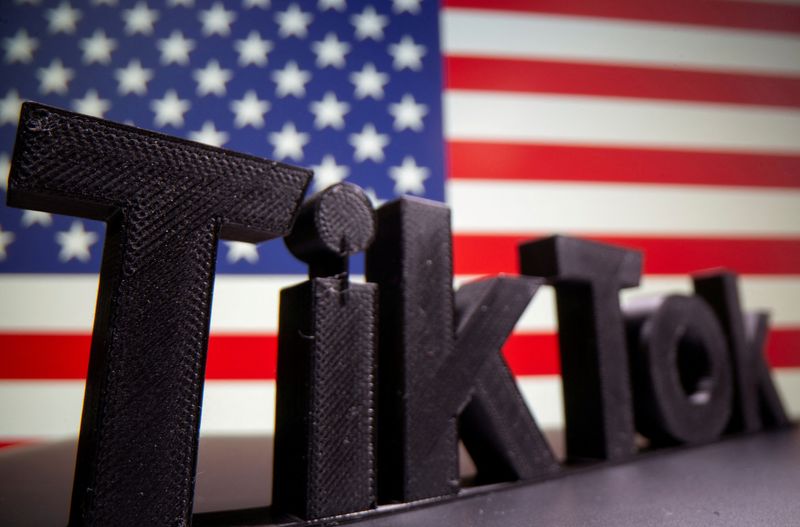By Echo Wang and David Shepardson
WASHINGTON (Reuters) - The Biden administration has demanded that TikTok's Chinese owners divest their stakes in the popular video app or face a possible U.S. ban, the company told Reuters on Wednesday.
The move is the most dramatic in a series of recent steps by U.S. officials and legislators who have raised fears that TikTok's U.S. user data could be passed on to China's government. ByteDance-owned TikTok has more than 100 million U.S. users.
It is also the first time under the administration of Democratic President Joe Biden that a potential ban on TikTok has been threatened. Biden's predecessor, Republican Donald Trump, had tried to ban TikTok in 2020 but was blocked by U.S. courts.
TikTok spokesperson Brooke Oberwetter told Reuters that the company had recently heard from the U.S. Treasury-led Committee on Foreign Investment in the United States (CFIUS), which demanded that the Chinese owners of the app sell their shares, and said otherwise they would face a possible U.S. ban of the video app.
The Wall Street Journal first reported the move. ByteDance confirmed that 60% of its shares are owned by global investors, 20% by employees and 20% by its founders.
China's foreign ministry responded on Thursday, saying that the United States had yet to provide evidence that TikTok threatened national security. Ministry spokesperson Wang Wenbin told a daily briefing that the United States should stop suppressing such companies.
CFIUS, a powerful national security body, had unanimously recommended in 2020 that ByteDance divest TikTok. Under pressure from then-President Trump, ByteDance in late 2020 unsuccessfully sought to finalize a deal with Walmart (NYSE:WMT) and Oracle Corp (NYSE:ORCL) to shift TikTok's U.S. assets into a new entity.
"If protecting national security is the objective, divestment doesn't solve the problem: a change in ownership would not impose any new restrictions on data flows or access," Tiktok's Oberwetter said in a statement.
The White House declined to comment.
TikTok Chief Executive Shou Zi Chew is due to appear before the U.S. Congress next week. It is not clear if the Chinese government would approve any divestiture and the Chinese Embassy in Washington did not immediately respond to a request for comment.
Last month, the White House gave government agencies 30 days to ensure they do not have TikTok on federal devices and systems. More than 30 U.S. states have also banned employees from using TikTok on government-owned devices.
Any U.S. ban would face significant legal hurdles and potential political ramifications, since TikTok is popular with millions of young Americans.
Last week, Democratic Senator Mark Warner said it was important the U.S. government do more to make clear what it believes are the national security risks from TikTok. "It's going to be incumbent on the government to show its cards in terms of how this is a threat," Warner said.
TikTok and CFIUS have been negotiating for more than two years on data security requirements. TikTok said it has spent more than $1.5 billion on rigorous data security efforts and rejects spying allegations.
TikTok said on Wednesday that "the best way to address concerns about national security is with the transparent, U.S.-based protection of U.S. user data and systems, with robust third-party monitoring, vetting, and verification."
Last week, the White House backed legislation by a dozen senators to give the administration new powers to ban TikTok and other foreign-based technologies if they pose national security threats. It could give the Biden administration new ammunition in court if they sought to ban TikTok.

White House national security adviser Jake Sullivan praised the bipartisan bill, saying it "would strengthen our ability to address discrete risks posed by individual transactions, and systemic risks posed by certain classes of transactions involving countries of concern in sensitive technology sectors."
The House of Representatives Foreign Affairs Committee this month voted along party lines on a much broader bill aimed at Tiktok, sponsored by Republican Representative Michael McCaul, that Democrats said would require the administration to effectively ban TikTok and other subsidiaries of ByteDance.